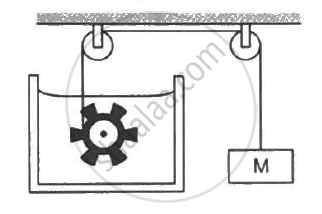Advertisements
Advertisements
प्रश्न
We would like to prepare a scale whose length does not change with temperature. It is proposed to prepare a unit scale of this type whose length remains, say 10 cm. We can use a bimetallic strip made of brass and iron each of different length whose length (both components) would change in such a way that difference between their lengths remain constant. If αiron = 1.2 × 10−5/K and αbrass = 1.8 × 10−5/K, what should we take as length of each strip?
उत्तर
According to the problem, L1 – Lb = 10 cm where,
L1 = length of iron scale
Lb = Length of brass scale
This condition is possible if the change in length of both rods is remain the same at all temperatures.
Change in length of iron rod,
`ΔL = α_IL_IΔT`
Change in length of brass rod,
`ΔL = α_BL_BΔT`
As the change will equal in both the rods, so
`α_IL_IΔT = α_BL_BΔT`
⇒ `α_IL_I = α_BL_B`
⇒ `L_I/L_B = α_B/α_I`
Here, `α_B = 1.8 xx 10^-5 K^-1, α_I = 1.2 xx 10^-5 K^-1`
∴ `L_I/L_B = (1.8 xx 10^-5)/(1.2 xx 10^-5) = 3/2`
`L_I = 3/2 L_B`
As, `L_I - L_B` = 10 cm
∴ `3/2 L_B - L_B` = 10
⇒ `1/2 L_B` = 10
⇒ LB = 20 cm.
APPEARS IN
संबंधित प्रश्न
Explain why a brass tumbler feels much colder than a wooden tray on a chilly day
A tightly closed metal lid of a glass bottle can be opened more easily if it is put in hot water for some time. Explain.
A metal sheet with a circular hole is heated. The hole
A steel frame (K = 45 W m−1°C−1) of total length 60 cm and cross sectional area 0.20 cm2, forms three sides of a square. The free ends are maintained at 20°C and 40°C. Find the rate of heat flow through a cross section of the frame.
Following Figure shows water in a container having 2.0 mm thick walls made of a material of thermal conductivity 0.50 W m−1°C−1. The container is kept in a melting-ice bath at 0°C. The total surface area in contact with water is 0.05 m2. A wheel is clamped inside the water and is coupled to a block of mass M as shown in the figure. As the block goes down, the wheel rotates. It is found that after some time a steady state is reached in which the block goes down with a constant speed of 10 cm s−1 and the temperature of the water remains constant at 1.0°C. Find the mass M of the block. Assume that the heat flows out of the water only through the walls in contact. Take g = 10 m s−2.

A semicircular rod is joined at its end to a straight rod of the same material and the same cross-sectional area. The straight rod forms a diameter of the other rod. The junctions are maintained at different temperatures. Find the ratio of the heat transferred through a cross section of the semicircular rod to the heat transferred through a cross section of the straight rod in a given time.
Consider the situation shown in the figure . The frame is made of the same material and has a uniform cross-sectional area everywhere. Calculate the amount of heat flowing per second through a cross section of the bent part if the total heat taken out per second from the end at 100°C is 130 J.

A room has a window fitted with a single 1.0 m × 2.0 m glass of thickness 2 mm. (a) Calculate the rate of heat flow through the closed window when the temperature inside the room is 32°C and the outside is 40°C. (b) The glass is now replaced by two glasspanes, each having a thickness of 1 mm and separated by a distance of 1 mm. Calculate the rate of heat flow under the same conditions of temperature. Thermal conductivity of window glass = 1.0 J s−1 m−1°C−1 and that of air = 0.025 m-1°C-1 .
The coefficient of thermal conductivity depends upon ______.
Heat is associated with ______.
